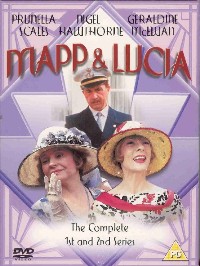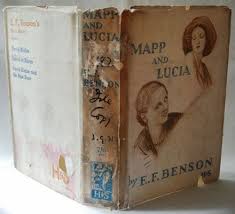
Edward Frederic Benson was an English novelist, biographer, memoirist, historian and short story writer.

Zuleika Dobson, full title Zuleika Dobson, or, an Oxford love story, is the only novel by English essayist Max Beerbohm, a satire of undergraduate life at Oxford published in 1911. It includes the famous line "Death cancels all engagements" and presents a corrosive view of Edwardian Oxford.
Philippa Jane Haywood is an English actress. She won the 2005 Rose d'Or Award for Best Female Comedy Performance for Green Wing (2004–2006). Her other television credits include The Brittas Empire (1991–1997), Chimera (1991) Prisoners' Wives (2012–2013) and Scott & Bailey (2012–2016). In 2018, she played the role of Lorraine Craddock in the BBC television series Bodyguard. In 2019 she appeared in series 4 of the BBC Radio 4 Show The Pin.

Arthur Annesley Ronald Firbank was an innovative English novelist. His eight short novels, partly inspired by the London aesthetes of the 1890s, especially Oscar Wilde, consist largely of dialogue, with references to religion, social-climbing, and sexuality.
Mapp and Lucia is a series of novels by E. F. Benson.

Steven James Pemberton is a British actor, comedian, director and writer. He was a writer and actor for BBC's The League of Gentlemen with Reece Shearsmith, Mark Gatiss, and Jeremy Dyson. Pemberton and Shearsmith also co-wrote and starred in the black comedy Psychoville and the anthology series Inside No. 9. His other notable television performance credits include Doctor Who, Benidorm, Blackpool, Shameless, Whitechapel, Happy Valley and Mapp & Lucia.

Chilham is a village and civil parish in the Borough of Ashford in Kent, England. It sits on the north bank of the Great Stour around 5+1⁄2 miles (8.9 km) to the southwest of Canterbury and 7 miles (11 km) northeast of Ashford. It is a mostly agricultural parish, with settlement clustered around Chilham village centre, which is next to the Grade I-listed Chilham Castle. Well-preserved roads and mostly residential listed buildings in the centre have led to its use as a location in television and film. Also lying within the civil parish is the smaller linear settlement of Shottenden, which is situated 1+1⁄2 miles (2.4 km) west of Chilham.

Tilling is a fictional coastal town, based on Rye, East Sussex, in the Mapp and Lucia novels of Edward Frederic Benson (1867–1940).
Riseholme is a fictional Elizabethan village in the Cotswolds in the "Lucia" novels of Edward Frederic Benson (1867–1940). It is thought to have been based on Broadway, Worcestershire.

Mary Anderson was an American theatre actress.

Headlong Hall is a novella by Thomas Love Peacock, his first long work of fiction, written in 1815 and published in 1816.
Lucinda Gane was a South African-born British actress, known for her role as the absent-minded science teacher Miss Terri Mooney in the children's television serial Grange Hill, a role she played from 1980 to 1983. In 1985–1986 she played Georgie Pillson's trusty housemaid Foljambe in two series of Mapp and Lucia, adapted by London Weekend Television from the novels of E. F. Benson. She also appeared in Thomas and Sarah, a spin-off from Upstairs, Downstairs, playing Emily Rudge.

Mary Benson was an English hostess of the Victorian era. She was the wife of Edward Benson, who during their marriage became Archbishop of Canterbury. Their children included several prolific authors and contributors to cultural life. During her marriage, she was involved with Lucy Tait, daughter of the previous Archbishop of Canterbury. She was described by William Gladstone, the British Prime Minister, as the 'cleverest woman in Europe'.

Mapp & Lucia is a British television series, set in the fictional Sussex coastal town of Tilling and based on three 1930s novels by E. F. Benson, beginning with Mapp and Lucia. It was produced by London Weekend Television, filmed in Rye and neighbouring Winchelsea in the 1980s, and starred Prunella Scales as Mapp, Geraldine McEwan as Lucia, Nigel Hawthorne as Georgie, and Denis Lill as Major Benjy. The script was by Gerald Savory. There were ten episodes, broadcast on Channel 4 in 1985 and 1986. The opening title painting was painted by the artist Reg Cartwright. These have been repeated over the years, and a new BBC adaptation, Mapp & Lucia, aired in 2014.
Queen Lucia is a 1920 comic novel written by E. F. Benson. It is the first of six novels in the popular Mapp and Lucia series, about idle women in the 1920s and their struggle for social dominance over their small communities. This book introduces Emmeline Lucas, known as Lucia to her friends, the social queen of the fictional Elizabethan village of Riseholme, as well as her husband Philip ("Peppino") Lucas, her best friend Georgie Pillson and her friendly rival, Daisy Quantock.

Miss Mapp is a 1922 comic novel written by E. F. Benson. It is the second of six novels in the popular Mapp and Lucia series, about idle women in the 1920s and their struggle for social dominance over their small communities. This book introduces Miss Mapp, the social tyrant of the fictional coastal town of Tilling, and the cast of Tillingites, including Diva Plaistow, Major Benji Flint, Mr. and Mrs. Wyse, and Quaint Irene. Tilling was inspired by the town of Rye, where Benson lived at Lamb House, with his own commanding view of the High Street inspiring Mapp's domain, Mallards.

Mapp and Lucia is a 1931 comic novel written by E. F. Benson. It is the fourth of six novels in the popular Mapp and Lucia series, about idle women in the 1920s and their struggle for social dominance over their small communities. It brings together two sets of characters from three previous Benson novels: Emmeline "Lucia" Lucas, Georgie Pillson and Daisy Quantock from Queen Lucia (1920) and Lucia in London (1927), and Miss Elizabeth Mapp and her neighbours from Miss Mapp (1922).

Secret Lives is a 1932 comedy novel by the British writer E. F. Benson, best known as the author of the Mapp and Lucia series. The structure is broadly similar to that series, featuring two strong-willed women battling for social supremacy in the fictitious Durham Square in Edwardian London.

Lucia's Progress is a 1935 comic novel written by E.F. Benson. It is the fifth of six novels in the popular Mapp and Lucia series, about idle women in the 1920s and their struggle for social dominance over their small communities. It continues the story from the 1931 novel Mapp and Lucia, which brought Emmeline "Lucia" Lucas and Georgie Pillson from Queen Lucia (1920) and Lucia in London (1927) together with Miss Elizabeth Mapp and her neighbours from Miss Mapp (1922).
Trouble for Lucia is a 1939 comic novel written by E.F. Benson. It is the sixth and final novel in the popular Mapp and Lucia series, about idle women in the 1920s and their struggle for social dominance over their small communities.














